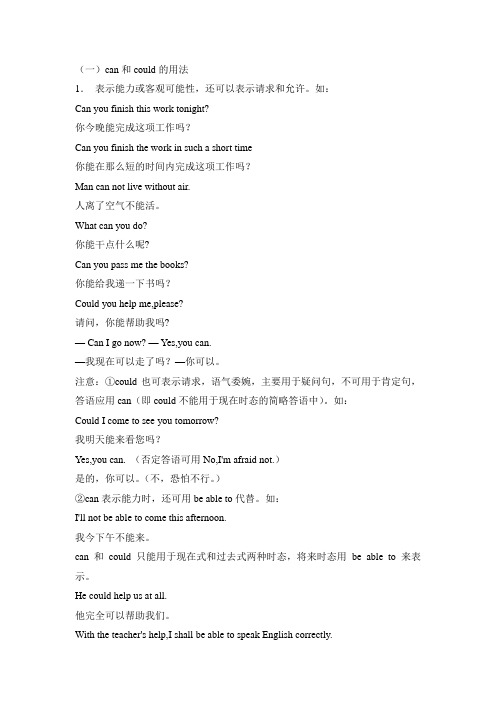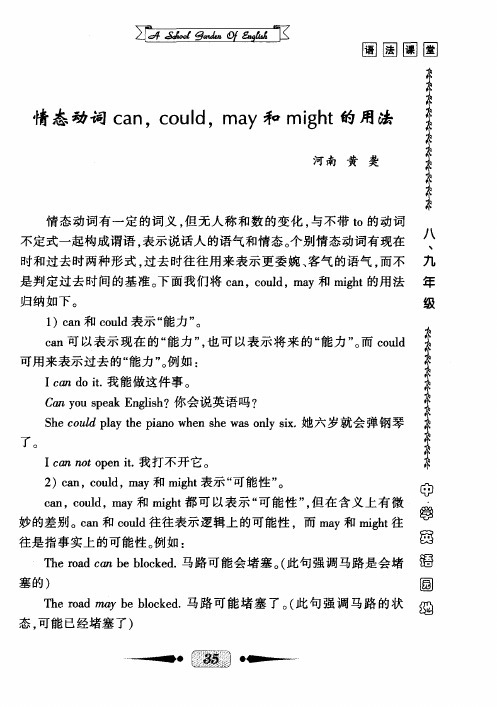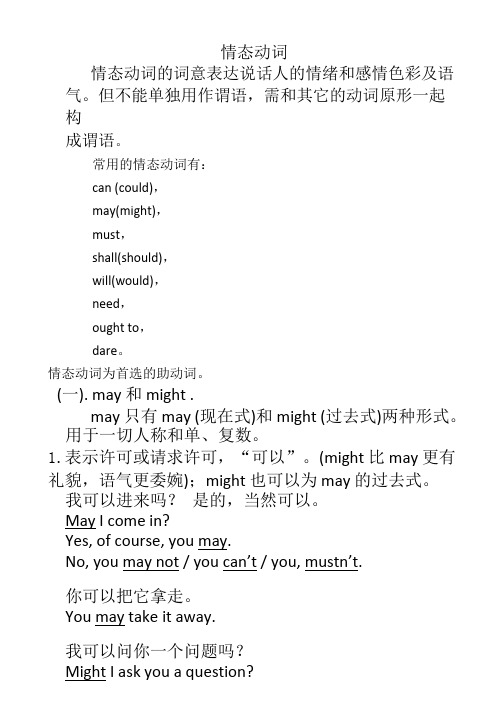情态动词-can-could-may-might
(完整word版)情态动词can(could),may(might)的用法

(一)can和could的用法1.表示能力或客观可能性,还可以表示请求和允许。
如:Can you finish this work tonight?你今晚能完成这项工作吗?Can you finish the work in such a short time你能在那么短的时间内完成这项工作吗?Man can not live without air.人离了空气不能活。
What can you do?你能干点什么呢?Can you pass me the books?你能给我递一下书吗?Could you help me,please?请问,你能帮助我吗?— Can I go now? — Yes,you can.—我现在可以走了吗?—你可以。
注意:①could也可表示请求,语气委婉,主要用于疑问句,不可用于肯定句,答语应用can(即could不能用于现在时态的简略答语中)。
如:Could I come to see you tomorrow?我明天能来看您吗?Yes,you can. (否定答语可用No,I'm afraid not.)是的,你可以。
(不,恐怕不行。
)②can表示能力时,还可用be able to代替。
如:I'll not be able to come this afternoon.我今下午不能来。
can 和could 只能用于现在式和过去式两种时态,将来时态用be able to 来表示。
He could help us at all.他完全可以帮助我们。
With the teacher's help,I shall be able to speak English correctly.由于老师的帮助,我将能准确地讲英语。
2. “can”表达推测例:Can the news be true? 这消息会是真的吗?The news can't be true. 这消息不会是真的吧。
情态动词must--can--could--may--might表推测的用法

情态动词m u s t--c a n--c o u l d--m a y--m i g h t表推测的用法(共4页)--本页仅作为文档封面,使用时请直接删除即可----内页可以根据需求调整合适字体及大小--情态动词must, can, could, may, might表推测的用法:情态动词中的must, can, could, may, might都表推测。
其中must的可能性最大,can / could次之,may / might最小。
具体用法如下:1. must的用法(1)表示推测“可能性”时,意思是“一定、准是”,语气较肯定,较有把握。
He must be American. = It is certain that he is American. 他准是个美国人。
(2)must表推测只能用于肯定句。
如果要表示“一定不、肯定不”的意思时,应用can`t,如询问某种可能时,应用can。
He must know my address. 他肯定知道我的地址。
(一定)He can`t know my address. 他肯定不知道我的地址。
(一定不)Can he know my address 他知道我的地址吗(询问可能性)(3)must表示推测时,可以推测现在/正在发生的动作/过去发生的动作。
He must have a car now. (现在)他一定有辆小汽车。
He must be doing his exercises in the classroom.(正在进行)他一定在教室里做练习。
He must have finished the work.(过去发生)他一定已完成了工作。
注:must表示推测时很少用于将来的情况。
一般不用He must come tomorrow.可用It`s certain / I`m sure that he will come tomorrow. (4)在反意疑问句中,当附属部分含有表示推测意义的must时,疑问部分的助动词应与must后面的动词在非推测情况下的用法保持一致。
情态动词用法及区别

情态动词用法及区别(一)、情态动词can、could、may情态动词是表示说话人的某种感情或语气的动词,用来表示请求、允诺、愿望、建议、命令、能力、需求或拒绝等情感态度,常用的情态动词有:can、could、may、might、need、dare、ought to、will、would、shall、should等○1情态动词can表示现在的能力,could 表示过去的某种能力,如:He can speak good EnglishSandy cannot danceThe old man could swim across the river when he was young注意:我们可以用be able to 来表示能力,be 动词的形式根据句子所用时态变化我们可以用情态动词may、could、can来表示许可○2情态动词could 表示一种委婉的语气,比用can 更有礼貌,may较正式。
如:Can I use your pen?Could we picnic here?May I see the letter?拓展:1、情态动词的用法:○1情态动词有一定的词义,但不能单独做谓语,必须与实义动词或连系动词连用,构成谓语。
如:Can I have a look at your photo?You may take whatever you like○2情态动词一般无人称和数的变化,如:We must stay in the classroom有些过去式不代表过去。
如:You might be rightI would like to have a talk with you○4情态动词后接动词原形,即不带to的不定式。
如:She may lose her way○5情态动词具有助动词的作用,可用来构成否定句、疑问句及用于简略回答。
如:Can you sing English songs?Yes ,I can2、常用情态动词的用法:May的用法:○1表示允许或征询对方许可,有“可以”的意思。
情态动词

情态动词的用法与考点情态动词包括:can, could, may, might, will, would, shall, should, must, need情态动词的基本用法:1.情态动词后必须跟行为动词原形.2.情态动词在变疑问句时可以直接提前.3.情态动词的否定形式是在情态动词后面直接加not.用法与考点:1. 表示能力--can, couldcan表示能力,相当于be able to,在过去时态中用could.eg: I can / am able to dive.I could / was able to dive when I was ten years old.2. 表示请求允许--can, could, may, 在使用时要注意它们的回答eg: --can I go out now?--yes, you can./ no, you can't.--Could I go out now?--yes, you can./ no, you can't.--may I go out now?--yes, you may./ no, you can't.注意:三种请求允许的否定回答形式都可以用no, you can't. / no, you mustn't. / no, you'd better not.3. 表示推测--can, could, may, might, must,但是其所表示的可能性大小不同。
& may, might 用来表示没有根据的猜测,表示事情的可能性不大,might 也可表达对过去发生的事情的猜测。
上下文中常有I have no idea. / I don't know. / I haven't decided yet. 等表示不确定因素的语言。
eg: He may/might go to the party with me tonight, but he haven't decided yet.He might go to the cinema last night.& can, could 表示有根据的推测,常常是根据生活常理可以推测出的事情。
情态动词can,could,may和might的用法

笠
H yb eof e 他 可 能在 办公 室 。 ema ei t fc. nh i
级
在 表示 “ 可 能” , 常用 c n 而不 用 m yn t 如 : 不 时 也 a’ t a o。例 IS e 'o kn w, ecnt ei sh o. 经 十点 了 ,他不 可 能 t no lc o h a 'b n c o1 已 ’t c 在 学校 。
C nyusekE g s?你会 说英 语 吗? a o pa nlh i
S e o l lytepa ow e h a nys . 六岁 就会 弹 钢琴 h udpa i h ns ew sol i 她 c h n x
了。
I a, o p ni 我 打不开 它 。 /n t e . c/ o t 2 a , o l, y和 mi t 示 “ )cn cud ma g 表 h 可能 性 ” 。
更有 礼 貌 。其 中 c n较 多地 用 于 疑 问句 和 否定 句 中 ,而 c ud在 表 示 a ol “ 能” 可 的推测 时 , 口气 上 比 Cl婉 转 。 如 : 在 a l 例
一
Tl ’ n t n . oeC/ i b ?那 个不 是 我 的 , 可 能是 谁 的 I t o mie Wh s Ott e as 它
0
学 圜
回 固
T era a ebok d 马 路可 能 会堵 塞 。 此 句强 调 马路 是 会 堵 晤 h dc nb l e . o c (
T era a ebokd 马 路 可 能 堵 塞 了 。此 句 强 调 马路 的 状 h odm yb lce. (
态 . 能 已经堵 塞 了 ) 可
I d nt k o o ' n w.Bu e c u d ' b n ca s o m.T e ca so m s t h o l nt e i l s r o h l s r o i
情态动词 - may might

情态动词情态动词的词意表达说话人的情绪和感情色彩及语气。
但不能单独用作谓语,需和其它的动词原形一起构成谓语。
常用的情态动词有:can (could),may(might),must,shall(should),will(would),need,ought to,dare。
情态动词为首选的助动词。
(一). may 和 might .may 只有 may (现在式)和 might (过去式)两种形式。
用于一切人称和单、复数。
1.表示许可或请求许可,“可以”。
(might 比 may 更有礼貌,语气更委婉);might 也可以为 may 的过去式。
我可以进来吗?是的,当然可以。
May I come in?Yes, of course, you may.No, you may not / you can’t / you, mustn’t.你可以把它拿走。
You may take it away.我可以问你一个问题吗?Might I ask you a question?他说我可以借用他的自行车。
He said that I might borrow his bike.我替你拿包好吗?May I carry your bag?2.may 表示推测 (现在和将来)“可能”“也许”。
might 是 may 的过去式。
might 还可为 may 的虚拟形式,表现在或将来的“可能”“也许”。
更加的不确定。
今天他可能来。
He may come today.他明天可能来。
He may come tomorrow.这消息也许是对的。
The news may be true.XQ 也许是个女孩。
XQ may be a girl.Maybe XQ is a girl.他明天可能不来。
He may not come tomorrow.他说她第二天也许会来。
He said that she might come the next day.我可以借你的自行车吗?Might I borrow your bike?他明天也许会来(更加不确定)He might come tomorrow.表示祝愿时,用may 放在句首。
(完整版)情态动词must、can、could、may、might精解

would :1. 表will的过去,用于过去将来时2. 表"意愿",乐意做某事3. 虚拟语气could: 1. 表can的过去,表过去的能力2 表请求(婉转语气)3. 表猜测:可能是...4. 虚拟语气should: 1. 表shall的过去,用于过去将来时,搭配第一人称2. 表婉转的语气: 应该做...3. 虚拟语气might: 1. may的过去,表猜测:可能是2. 表许可(婉转语气)may: 1. 表猜测: 可能是2. 表许可think of 想起, 想到; 没有think from的用法一.shall和will的用法1、shall 用在第一、三人称,will 用于第二人称表示“征求意见”。
Shall I go now?Shall we invite her, too?Will you help me with the work?Shall the reporters wait outside or what?2、shall表示依据规定有义务去做。
Passengers shall not talk with the driver while the bus is moving.3、shall 用于所有人称,表示说话人的许诺、威胁、警告、命令等。
You shall have an answer by tomorrow.If he’s good, he shall have a new watch for Christma s.If you children don’t do as I tell you, you shan’t go to the party.4、would 可以表示过去的习惯(would 可表示反复发生的动作或某种倾向。
used to表示过去的习惯动作或状态,强调现在已不存在)He would come to see me on Sunday when he was here.The dog would lie there in the sun all afternoon.When we were children, we would go skating every winter.5、will可以表示“愿意”,而非将来:I will pay you for it. 我会付给你钱买下它的。
can could may might的区别与用法

can could may might的区别与用法近年来,许多学习者都遇到了can、could、may、might等英语中常用的助动词的困惑。
特别是这几个助动词有着很细微的区别,用错了就会大大影响语言表达和意思的表达,很容易就会让人误解。
因此,要想运用英语使用正确,了解这几个助动词的不同之处是很有必要的。
首先,我们来看“can”。
它是一个常用的情态动词,表示能力、许可或允许的意思。
例如:He can speak English.他会说英语。
我们可以用它来表示能力,也可以用它来询问答复,比如:Can you help me?你能帮助我吗?其次,是“could”。
它也是一个情态动词,表示能力或许可,但它与can有着非常重要的区别:它能够表达过去的能力或许可,而can则表示现在。
例如:He could speak English last year.去年他会说英语。
第三,我们来看“may”。
它也是一个情态动词,表示可能性,它的意思是“可能会……”或“可能不会……”。
例如:He may be here in a few minutes.他可能几分钟内就会到这里。
最后,我们来看“might”。
它也是一个情态动词,与May有着很大的相似之处,可以用来表示可能性,但与May有着微妙的区别:它可以表示比May更小的可能性。
例如:He might be here in a few minutes.他可能会在几分钟内到这里。
综上所述,可以看出Can、Could、May、Might在英语中起着非常重要的作用,用来表达能力、许可、可能性等等。
它们的区别也非常的细微,要想正确运用它们,练习是很有必要的,只有通过多多练习,才能掌握它们的正确用法。
此外,学习英语时要注意音标,以加深理解和拼写,Can [kn]、Could [kd]、May [me]、Might [mat],要正确读出它们的发音,从而更好的学习使用它们。
以上就是Can Could May Might的区别与用法的简单介绍,希望能给大家带来帮助,让我们更好的掌握它们的正确用法,合理地运用它们表达自己的口语和书面表达能力。
- 1、下载文档前请自行甄别文档内容的完整性,平台不提供额外的编辑、内容补充、找答案等附加服务。
- 2、"仅部分预览"的文档,不可在线预览部分如存在完整性等问题,可反馈申请退款(可完整预览的文档不适用该条件!)。
- 3、如文档侵犯您的权益,请联系客服反馈,我们会尽快为您处理(人工客服工作时间:9:00-18:30)。
can , could
表能力
会, 能 can = be able to I can speak a little French. Can you play volleyball? Even a small computer can calculate very fast.
can, could
can, could
表可能性(否定句)
不可能 It couldn't be Dad. He won't be back this time of evening. You can't be serious! could 比can可能性更小
can/could have done
表示对过去的推测 Ryan
may; might
可能(to
表可能性
express possibility) The reason of this accident may never be discovered. Peter might phone. If he does, could you ask him to ring later?
Keith
can be really stubborn. The winter in Changchun can be warm. Anybody can make mistakes. The winter in Changchun could be warm in the past.
Model verbs
情态动词
表推测、可能性 2. 表许可,允许 3. 表责任,义务
1.
can,
could may, might must, have to shall, should, ought to will, would used to be to be supposed to need, dare
may, might
1.
表许可
请求(to request) Might I have a few words with the boss? -May I help myself to some more may food? -Of course you _______. 2. 允许(to be allowed to) A reader can borrow 6 books at
表可能性
can't have read this book, because he knows nothing about it 本应该做 You are late again, you could have come earlier.
can, could
1.
表许可
请求(to request) Can you give me a hand with this box? Could you help me with this box? Can/ could you make a little less noise?
can, could
2.
表许可
允许(to be allowed to) -Can/could I use a calculator at an exam? can - Yes, of course you ______. 3. 建议 (to make a suggestion) I could/can do the homework for you, if you are too busy.
may 表祝愿
May
sb. do... May you all succeed in whatever you do! May you both 2. must
表能力
会,能 could= was/were able to I could swim very well when I was only six years old. Nobody could figure out this problem
can, could表可能性(肯定句中)
有时会
